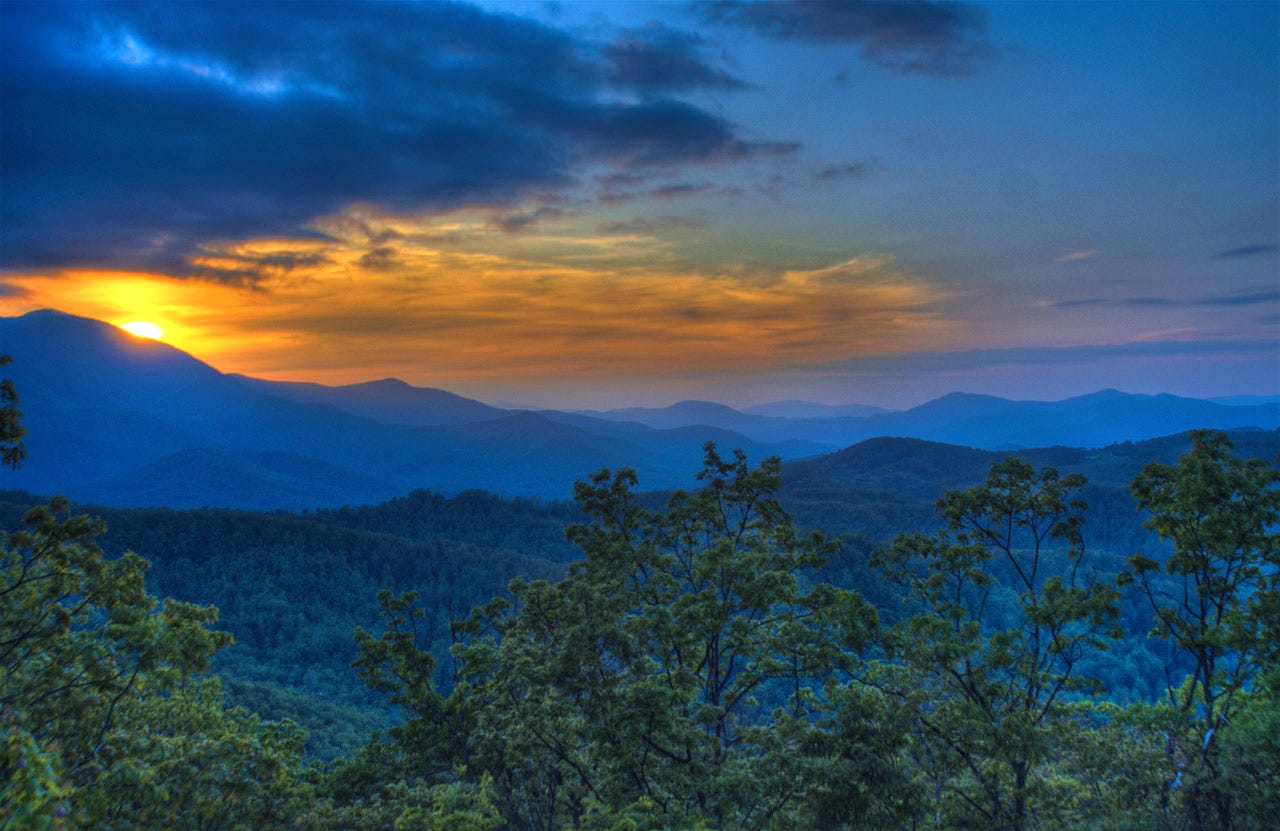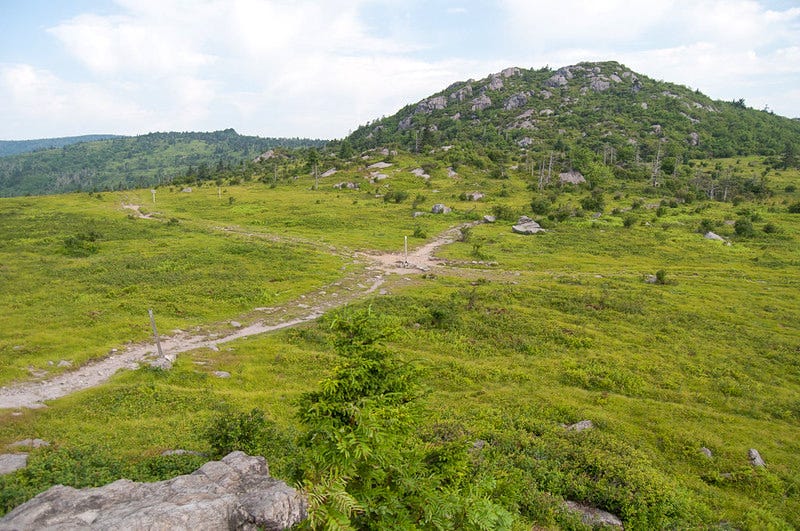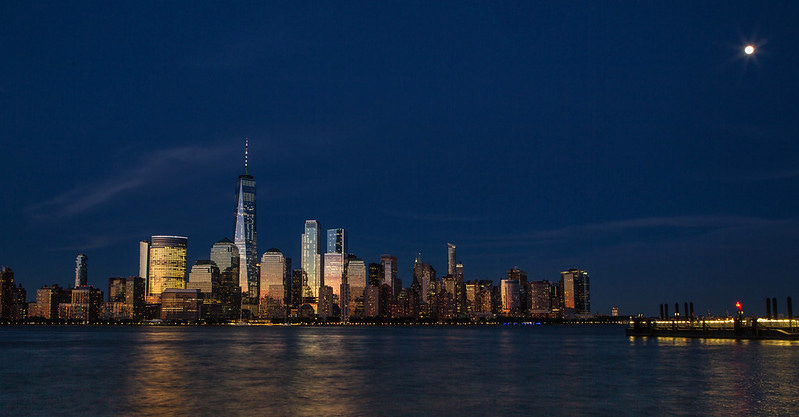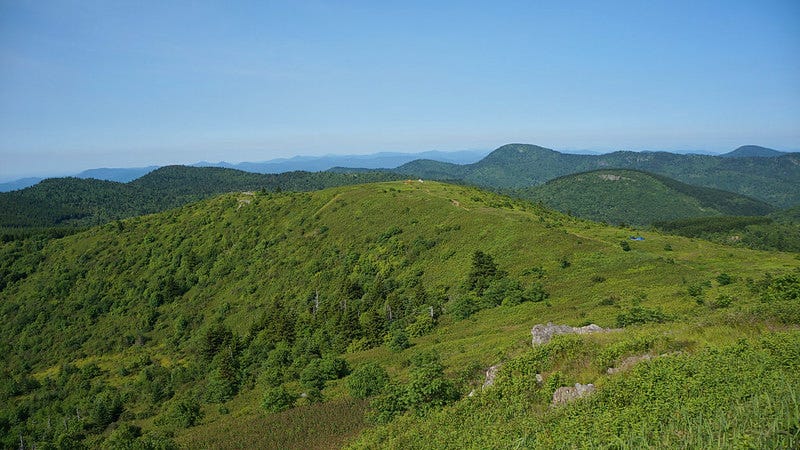(Blue Ridge Mountains | Flickr CC / Timothy K Hamilton)
Up ahead, there’s a tree towards the left that looks like someone from Top Chef. “Dude, it totally looks like him.”
I squint my eyes and let the blurriness distort its branches - the various twigs and leaves eventually shaping into a human face - or, at least, humanoid. There, a sweeping hairline; here, a smirk framed by the lines of a dimple. I’m not sure if I actually see it, or if I let Jake convince me that it’s there. He’s got a way of doing that: convincing me of seeing something that isn’t there. It’s a pretty wild gift for a guy who’s going blind.
“Sure, yup, I see it.”
Hearing the hesitation in my voice, Jake turns around to give me one of those looks. The one he reserves for the people in his inner circle: a stoic resignation mapped on his face, the wrinkles around his mouth softened, those green-grey eyes seemingly emotionless but expectant.
I laugh at him. I’m used to this look. I’ve seen it at least once a week for nearly two years. “Look, all I’m saying is that it’s just a tree. It looks like every fifth tree we’ve passed.” To my surprise, he doesn’t argue. We keep going.
(Grayson Highlands | Flickr CC / Patrick Connelly)
It’s September. And even though the summer heat hit later in the season this year, there’s already been a few colder days in the region. Making our way through the Grayson Highlands, we see patches of green slowly transitioning into red and yellow hues - the wild ponies we pass becoming a mere secondary recompense for our days of sacrifice trekking through these lands.
“Sacrifice”, of course, is an embellishment - a lie meant for the both of us to feel better about our lives. Our personal sacrifices being that of our productive bodies - away from the jobs that feed our Seamless diets and nights out in Williamsburg and second copies of Infinite Jest because we forgot we already own it (because we haven’t read it nor will we). Here, on these mountains, we’re oblations to a higher being from which we’re hoping to find some level of enlightenment.
Here, on these mountains, we’re oblations to a higher being from which we’re hoping to find some level of enlightenment.
But we’re not going to find that here. I know this. Jake knows this. At least not in the four days we’ve blocked out for this trip. Instead, what we’ll find is a break from the city that gifts us with anxiety attacks and an occasional second date.
The air around us smells like orange peel and wet grass. Several more trees come and go before we say anything else to each other - the stillness between us seeming even more muted than what little noise surrounds us. It’s nearing dusk and the birds aren’t chirping as loudly - the only sounds coming from the occasional wind navigating between the branches and the boulders, and the soft crunching of our boots over trails. “We could have gone to Colorado. He wouldn’t have known, you know.”
“I know,” I whisper in response, catching the slight quiver in my voice. “I just didn’t want to risk it.”
It was my idea to go on this trip. It had been almost a year since I’d been back in Virginia, and more than two since I’d even stepped foot near a mountain. I brought it up as a joke one weekend.
Sitting alone in my studio apartment in the Lower East Side, watching some influencer dude’s cross-country road trip on YouTube, I remember feeling equal parts jealousy and bitterness. The audacity of this fucking guy roughly my age living in a van and visiting national parks, and why the hell was I not living that!
“I just let this 28-year-old entrepreneur dick-slap me with this content,” my text read, sending Jake the link.
“Haha - I actually know this dude. He went to Duke too.”
I’m no longer surprised when he says things like this. Two years younger than me, Jake somehow knows everyone we went to undergrad with. There was that time we were out at a restaurant in the West Village and our group got seated next to a girl he remembered meeting one time at Duke. Not even friends - literally just met her once. He struck up a conversation that night; it turned out to be a good night. Another time, we managed to get into a sold-out concert hosted in some warehouse venue out in Bushwick only because he recognized a name on the list of organizers - some guy who played on Duke’s baseball team apparently.
And then, of course, there was me.
I never attend alumni events in the city, but decided to go with a couple of friends to watch Duke play Syracuse. It was hosted in this go-to sports lounge for alumni on the Upper West Side, the kind that normally caters to the aspirational and gaudy: dark, lacquered wood flooring, booths lined with cheaply-marbled leather seats, and framed black-and-white prints of tastefully-nude women pretending to be in their early 20s. Impressive to a 21-year-old from the Midwest maybe, but it’s a weird spot for the intellectual beau monde of egotistical Blue Devils if anyone’s being honest. Waiting in line for the bathroom at some point between the first and third quarters, all I remember was his voice shouting my name: “Andrew! Yo, Andrew!”
“We should plan a trip somewhere,” I write back. “I just need to get the fuck out of here for a few days.”
“Yeah, I’d be down. What about Denver?”
“Uhh, I’d rather not. He moved there, remember?”
“Oh, shit, haha - my bad, dude. Colorado’s a big fucking state though. We’re not going to run into him randomly on some mountain.”
“YOU NEVER KNOW.”
“Are you really going to avoid visiting an entire state just because he lives there?”
We settle down on the Highlands and set up camp. Here and there we’re surrounded by boulders - themselves shaped like little mountains, smooth lines and jagged little peaks on their grey-and-clay-colored faces. I read somewhere that this entire area around Mount Rogers used to have a lot of volcanic activity, and that it’s the only place in the state where scientists have found signs of ancient glaciation in the rocks. It’s strange thinking of those stories hidden within the identity of each boulder; it’s strange thinking that I wanted to be them - remolded over time, but emotionally unchanged.
It’s strange thinking of those stories hidden within the identity of each boulder; it’s strange thinking that I wanted to be them - remolded over time, but emotionally unchanged.
The sun is still out when we’ve finished setting up. Backpacking this trail could have taken us two days, but our movements are pretty limited without a fair amount of daylight. Or, at least, Jake has his limitations.
When he was seven, Jake started complaining to his parents about rooms that were too bright and rooms that were too dark. He would trip over toys that, to a normal kid, would have been within his peripheral vision. Initially labeling him finicky and clumsy, his parents would discover later in that same year that he had retinitis pigmentosa, a condition where the cone cells in his eyes die over time, narrowing his field of vision with every passing year. “Imagine walking backwards from the outside to the inside of a tunnel, the light in front of you getting smaller and smaller until all you see is darkness and all you have is yourself,” he once described. I couldn’t imagine it; the notion alone is terrifying.
“I think there’s something on that Christmas tree,” jokes Jake, pointing to a Fraser fir standing about twenty feet away from us.
“It’s literally just another tree,” I laugh.
“No, really, there’s something hanging on it.”
I take another glance.
There’s a piece of black fabric tied around one of its branches. It’s a small flag maybe, or a head wrap. Had the wind not been blowing, it would have been hard to spot.
“You know, this forest is one of the few places left in America where Fraser firs aren’t farm-grown,” Jake changes course. “I Googled it before we left. In the majority of areas where they can be found, they’ve essentially been decimated by this tiny ass bug from Spain or Greece or wherever in Europe.”
“Maybe it’s because this place used to have volcanoes - maybe it’s something in the dirt.”
“How crazy would that be? That some volcanic residue in the soil is drugging up these trees with some special kind of nutrient that’s keeping them protected. Someone should be doing research into this.”
“Uh - I’m sure a few people with PhDs are on top of it,” I joke. I laugh, but he knows that I mean it in earnest.
Back at Duke, Jake and I weren’t friends. Not really. We met initially through one of the larger outdoors student clubs on campus. A Patagonia-clad group of mostly-white granola guzzlers from California and Georgia and Vermont. Each semester, they would plan a major backpacking trip through various mountain ranges along the East Coast. He joined during the spring semester when the group had planned a trip through the Art Loeb Trail. He was attractive and he was nice; I didn’t know who I was. I quit the club after that trip.
I didn’t talk to him again until my senior year. Or maybe I did and chose to block it out of my memory.
There’s a longstanding tradition at Duke where seniors climb the steps to the top of the Chapel tower - a final goodbye or fuck you to the university, with all of Durham laid out in front of you. Jake was one of the student assistants for building & facilities. I knew it was him once we walked in, but gave no hints at recognition. He walked us through the list of things we weren’t allowed to do while climbing the tower and the etiquette for once we reached the top. It was only afterwards and walking towards the exit did I hear from behind my shoulder “It was good seeing you, Andrew.”
“Thanks. You, too!” is how I want to believe I responded. In reality, I don’t think I uttered a word.
In New York, Jake was the only one of my guy friends to talk me through my break-up. My friends aren’t bad people (or, at least, not that I know of). It’s just hard, I think, when you’re the only guy in your main group of friends who’s into…well…guys.
We hit if off after our encounter at the Syracuse game, and we’d been friends for about eight months by the time my relationship had ended. He was the first person I texted. He cancelled on his girlfriend.
“There are other guys in this city. We’re just going to have to find a new one for you.” That’s all I can remember him telling me that night on my couch, my head on his shoulder with tears crawling down my cheeks, my lungs short of breath.
(New York City at Night | Flickr CC / Martin Hesketh)
“I forgot how dark the night can be,” says Jake. The sun has left the sky, replaced by a scattering of stars. “You don’t get this kind of darkness in the city.”
We’re sitting outside our tent, with a camping lantern nestled between us. The wind has calmed and in its place are the sounds of summer cicadas and an occasional hoot from over the ridge. There are two other campers set up a few yards away, but like us are sitting quietly and looking up at the night sky.
In never gets dark in New York. Not truly. Regardless of whatever borough you’re in, the blackness of the skies above your head feels undeveloped. Not that the skies are necessarily bright at night. No, that’s not it. Because in the city even the stars are hidden - their lucency muffled by the unnatural lights that make New York a world attraction. It’s as if there’s a gap in the universe above New York City, its night sky devouring whatever light touches it but never satiated - the result a softened darkness holding the secrets of everyone that has come and gone.
It’s as if there’s a gap in the universe above New York City, its night sky devouring whatever light touches it but never satiated - the result a softened darkness holding the secrets of everyone that has come and gone.
“Well, you’ll have to get used to it, bud. Sooner or later, it’s all you’ll see.” I say this in jest but it comes off mockingly. I’ve fucked up and I know it before sensing any kind of tension.
To my left, Jake moves a little and I know that he’s looking my way. I don’t want to turn and have to face up to my shame. We joke a lot about his eyesight, but I know how sensitive he actually is about it. I know that the prognosis isn’t looking great. His doctor wants him to start looking into service dogs in the next year. For someone like Jake, any loss of autonomy is a miniature death.
“I’m sorry - I didn’t mean that,” I rush, finally turning in his direction. “I got caught up in the moment and my mouth couldn’t shut the fuck up.”
He sighs. We concede back to our silence. A familiar scent wafts over us; the campers nearby are making Tex-Mex.
I still remember the trip through the Art Loeb Trail. There was about fifteen of us in the group. We managed to fit ourselves into two vans to drive the four hours from Durham to a spot a little ways outside of Asheville to start the trail. At the time, I was good friends with a girl named Ashley. She was your standard Duke-sorority-pretty, a small scar above her left eyebrow one of her few idiosyncrasies. We’d dated for a few months previously. Things fell flat but the friendship remained intact. She’d gotten me to join that club.
Jake was placed in the same car with me and Ashley. From Ashley’s prying during the ride, I learned that Jake was from Vermont. He grew up surrounded by mountains - raised by the Taconic, Green, and Adirondack Mountain ranges. His family moved out to Middlebury from Santa Barbara when he was seven because his dad got an offer to teach at the college. They have two dogs. He likes Rice-A-Roni.
Out on the Art Loeb Trail, past the exposed rock face views of Silvermine Bald, you walk your way through Black Balsam Knob, a relatively flat expanse of land set atop a ridge that overlooks the Blue Ridge Mountains. No matter where you turn, the only thing in sight are peaks and curves - the blues of the ridges going from darker to lighter as your eyes look farther out in the distance. In late-spring, the clouds are softer, and what you’re left with is a reposeful effigy to figureless pagan gods - asleep and undisturbed in the light.
In late-spring, the clouds are softer, and what you’re left with is a reposeful effigy to figureless pagan gods - asleep and undisturbed in the light.
I remember that night, camped out on the Knob under that Carolina sky. Our group was up late. We stayed up later. He told me about his siblings, evolutionary anthropology, and potassium decay in bananas. I held his hand; he didn’t let go.
(Black Balsam Knob | Flickr CC / Patrick Mueller)
It’s morning, and our neighbors have already packed up and left. Jake and I finish up the pancakes we’ve made and collect our gear. The summit on Mount Rogers is supposedly covered in woods, so we’ll probably camp out in this same area on our way down later today.
At some point on our hike up the mountain, Jake pauses. “Will we still be friends once it happens?”
I hesitate. Not because I’m afraid of disappointing him, but because I can feel the fear and apprehension in his voice. I know that he’s referring to the inconvenience of helping the handicapped (his words, not mine). Of dislike and abandonment. “That’s dumb, blind man - of course we will. Plus, to me, you’ve always been kind of in the dark.”
He laughs. This is what we always come to - an acquiescence of each other without any lingering enmity. Our silent, shared experience.
We’ll reach the summit in two hours.








